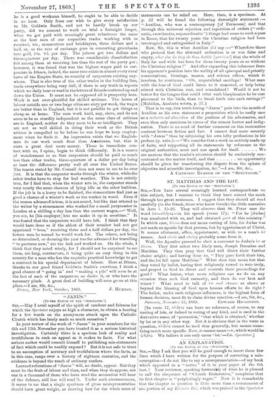ST. MATTHIAS AND THE LOT.
[TO THE EDITOR OF THE "SPECTATOR.) Sin,—Yon have several seemingly learned correspondents on this subject, but I venture to think they have missed the mark through too great acuteness. I suggest that they should all read carefully (in the Greek, those who know Greek) the little narrative in Acts i. 15-26. They will observe that St. Peter uses the word lot—aX-4po;—in his speech (verse 17); "For he [Judas] was numbered with us, and had obtained part of this ministry." In which case, kleros does not mean casting of lots, for Judas was not made an apostle by that process, but by appointment of Christ. It means allotment, office, appointment, as with us a man's lot means. And cleric and clerisy probably come from it.
Well, the Apostles proceed to elect a successor to Judas's lot or Neros. They first select two likely men, Joseph Barsabas and Matthias. They then pray that God will direct their farther choice aright; and having done so, "They gave forth their lots, and the lot fell upon Matthias." What does this mean but that they voted by ballot, having first religiously vowed to vote truly, and prayed to God to direct and overrule their proceedings for good ? What better, what more religious can we do on any occasion than seek God earnestly, and then do •our best and
wisest ? What need to talk of lot and chance as above or beyond the blessing of God upon human efforts to do right? The ballot, under such religious influences, is the highest form of human decision, most fit to claim divine sanction.—I am, Sir, &e.,
[In verse 17, xXiipoc can have no reference, of course, to any casting of lots, or indeed to voting of any kind, and is used in the derivative sense, of 'possession,' 'that which is obtained,' whether by lot or in any other way. But it is obvious that in the verge in question, r-X-iipg cannot be used thus generally, but means some- thing much more specific. Now, it cannot mean rote, which would be 4;i9oc. We believe it can only mean lot.'—En. Spectator.]


































 Previous page
Previous page